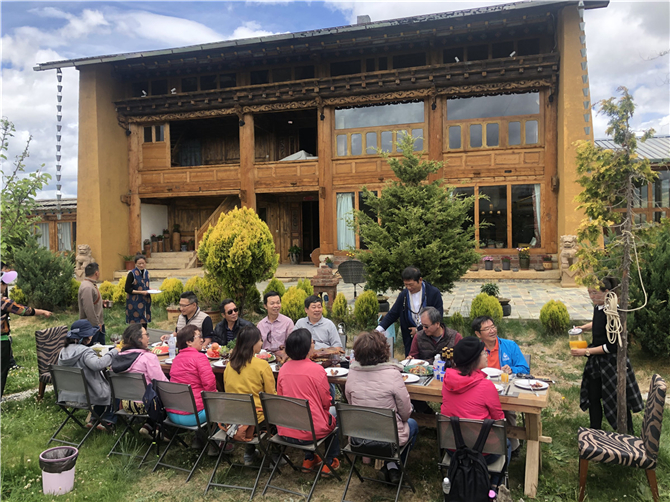Paradise found in northwest Yunnan

Guests enjoy a meal in the yard of Dakpa Kelden's home in the countryside of Shangri-La. [Photo provided to CHINA DAILY]
Social contributions
Dakpa Kelden, who's the descendant of a former ladho (muleteer) on the Tea Horse Road, views his hotels as contemporary versions of netsang (lodgings) that dotted the ancient route.
His father told him that relationships between ladho and people running netsang were based on mutual trust. Netsang operators would warn ladho to leave if there were risks, such as robbers or avalanches, even though the lodge owners would lose money when their guests departed.
Dakpa Kelden's father, who used to spend months traveling between Shangri-La, Lhasa in the Tibet autonomous region and Kalimpong in India in the 1940s, dreamed of becoming a jindha. Jindha were successful caravan operators in charge of regional guilds, whose wealth and status enabled them to make such social contributions as improving business environments, caring for the elderly, and building healthcare facilities and temples.
Dakpa Kelden has made his father's dream his own.
In 2006, he set up a thangka (Tibetan Buddhist scroll painting) academy. Students of all ages and incomes receive free instruction, meals and accommodation. They can master the skills within four years sufficiently enough to earn a living practicing the art form.
Dakpa Kelden values thangka as carriers of Tibetan culture, religion and architecture, and says they also promote such concepts as environmental protection.
In 2017, he took over a struggling social enterprise dedicated to training local women living in poverty and people with disabilities to earn extra cash by sewing handicrafts.
His team provides raw materials and designs, invites teachers and develops sales channels. The local government sponsors the instruction.
The 30 or so regular participants keep half of the revenues of most products, says Tsering Drolma, who was devoted to traditional Tibetan culture's preservation for 13 years before joining Dakpa Kelden in 2017 to run the social enterprise.
Dakpa Kelden plans to continue the business as long as it can make ends meet.
In April, he joined a friend in running a brand called Norlha that sells high-end yak-wool products made by herders in the Gannan Tibetan autonomous prefecture in Gansu province. The goal is to improve their incomes and counter such challenges as grassland degradation, poor harvests and unexpected yak deaths.
Caravan spirit
Dakpa Kelden says he's grateful for his major life decisions, including moving to Yunnan with his father in 1987, quitting a civil service position, becoming a tour guide for foreigners in the 1990s, studying abroad and starting his own businesses.
He's building more boutique hotels along the Tea Horse Road and is planning to revive the traditional woodcarving craft he believes reflects Tibetan people's depth of thought, creativity and sense of art.
A growing number of carpenters are abandoning the declining trade to work as drivers for tourists.
Dakpa Kelden recalls one foreign guest was so fascinated by the carving that he spent a whole week with practitioners in the 1990s.
Ultimately, he says, he hopes to follow his childhood dream to share the caravan spirit of the ancient trade route-an outlook characterized by trust, cooperation and harmony.
Editor: John Li